Self-Publishing Emotions, Hyper-Supportive Communities and the Pitfalls of Grimdark
In a word, my personal experience of self-publishing was… complicated. Not because the work is hard, not because I had to learn about algorithms and ad copy and ISBNs, but because of the how every moment of joy and hope was too often balanced ten-fold by the trauma of my own disillusionment. I don’t speak for everyone, of course, but I want to address some interrelated issues I’ve observed in the self-publishing community and how so much of it comes back to the weight of big emotions.
Big Self-Publishing Emotions
For those who don’t know me, I started self-publishing in 2013. WE RIDE THE STORM, my breakthrough book if you will, didn’t come out until half way through 2018 and even then it wasn’t a super success like most people assume. Somehow, I got the dream luck and a Big 5 editor snapped me up, but I say with all honesty that I’ve never been a highly successful self-publisher in terms of income. Those who make six-figure incomes are in a different league.
What the odd trajectory of my career has given me is a fairly unique perspective on how the difference between being self-published and traditionally published feels, adjacent to the authorial emotions and struggles we all share. I feel this is valuable because as much as we want to be treated the same no matter how we publish, most likely as a self-publisher you’re seeing everything through the lens of a different set of emotions.
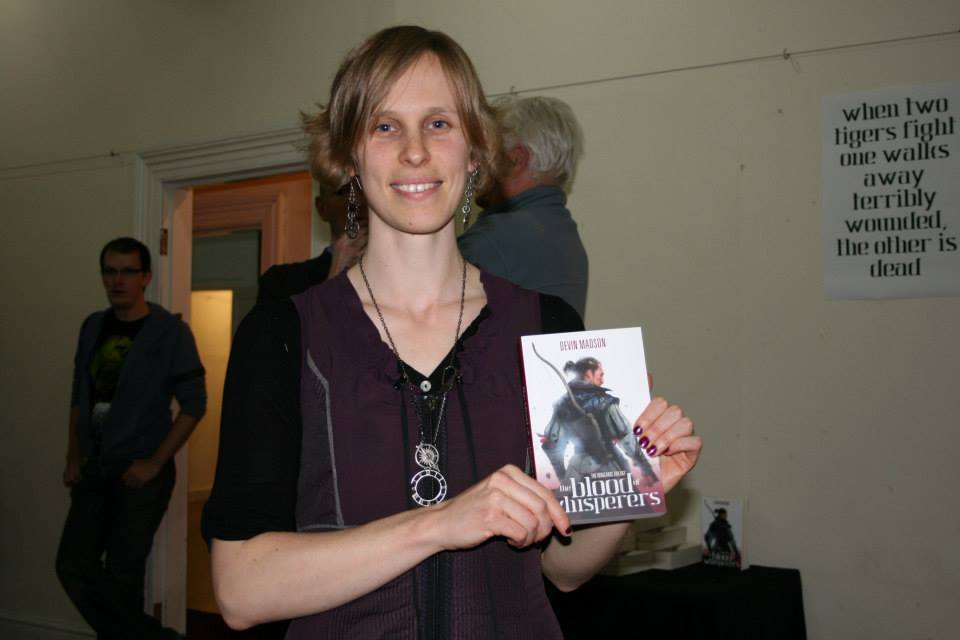
Me at my first ever book launch, releasing THE BLOOD OF WHISPERERS in 2013
Something I’ve noticed is that traditionally published authors often make light reference on social media to their various struggles from imposter syndrome to motivation to terror of people actually reading their work, and often find discussing the shared experience of feeling like the new little nobody at the table to be cathartic. These same thoughts and experiences are more often raw wounds to self-publishers. Every admission of doubt is too close to what feels like a core of truth, because whatever we KNOW about gatekeeping being arbitrary and subjective, it’s almost impossible to escape the deep human need for validation.
Year on year the stigma against self-publishing diminishes and many people make good money doing it, but neither has done much to stop the feeling that traditional publishing looks like a dream. A golden ticket. Something to be hoped for even while telling yourself you’re happy where you are and don’t need/want to change. Because the reality is that most self-publishers feel looked down on. Even admitting you self-publish can feel embarrassing, especially when people in real life ask about your books. The feeling you need to defend your own choices and creations leads to a lot of ‘WE DON’T NEED GATEKEEPER VALIDATION’ railing and while it’s true, the intensity is hiding disappointment and hurt we would rather not acknowledge let alone examine. What could we change even if we did?
When you get right down to it, self-publishing is exhausting. Not just in the sense of being more work (although it is a lot of work) but in the way it constantly takes from you. The most common journey of the self-publisher begins with excitement and enthusiasm only to face the ever-growing feeling you’re wasting your time. This is because like everything in our capitalistic world (including traditional publishing), success at self-publishing relies very little on how good your book is and a lot on how much money you can throw at marketing. And even so the odds of success are slim. A lot of the most successful self-publishers have been doing it for a long time and have built up a following, many having started back before self-publishing became as pay-for-play as it is now. Before Amazon changed its algorithms. Before their advertising market reached such saturation.

Real book! On Real shelf! I treasured this photo in the doubtful times
The early stages of getting a cover and seeing books printed are great, but they all too soon give way to realities. That, honestly, people just don’t care. You have to make them care. You have to sell your book to people with already overwhelming to-read piles, and shouting ‘read this, it’s great’ into the void doesn’t work. You need reviews. You need social proof and word of mouth and a positive Goodreads score and even then, there’s so many books why should people read yours? Even if you’ve studied the algorithms and are throwing money at advertising, it often doesn’t amount to anything and you have to fight the feeling of failure every day while you tell yourself to sit down and write and just keep going.
So when you enter a competition like the Self Published Fantasy Blog Off (SPFBO) there is a feeling that here, maybe, is the ticket away from these feelings. Here is a chance of success. We always tell ourselves not to get our hopes up about things, to expect the worst, but hope has a way of wheedling its way into your heart all the same. A determination never to give up opens the way for it. So when you get a less than stellar review or your book is cut, it doesn’t feel the same as when traditionally published authors get bad reviews, because the one thing you do get when you sign that contract is a grain of validation you can tuck away into your heart and hold onto for dear life.
While this means that yes, of course judges should be mindful of what they’re saying in their reviews, it also means that in order to take part in a competition like SPFBO, or to send your work out for critique, seek reviews, representation, or pretty much any other thing that involves people reading and having opinions about your work, you need to understand that you’re seeing these critiques through a skewed lens. Yes, these things will hurt, they do regardless of how much validation you’ve squirrelled away, but it’s not because people are being extra mean or you extra suck at this, it’s because you’re already carrying heavy emotions just by choosing this road.
The Dangers of Hyper-Supportive Communities
All that being the case, it’s natural to seek out a support network built of people who know exactly how it feels to fight their way through the mires of a self-published career, a network who will amplify your own self-assurances. I’ve been in quite a lot of these groups in my time and the main thing they all have in common is hyper-support, which often manifests as support based on lying. On telling people they are doing well, that their cover is amazing, that it’s only a matter of time, that their books are brilliant and others just can’t see it yet. I understand why. Being an author of any kind is hard work, it’s personal and draining and adding to someone’s misery with honesty just seems like a step too far. The kind lies also serve the dual purpose of reassuring yourself about your own career. You’re doing well, it’s fine. Your work is brilliant, people just can’t see it yet. Keep going.
And you need this reassurance because every time you see few or no sales on your amazon account you wonder why you do this. Hopelessness and desperation rear their heads. You see traditionally published (and some uber successful self-publishers) getting deals and awards and being invited onto panels and your sense of imposter syndrome grows. However much we know logically there is no reason why one form of publishing is inherently better than the other, the feeling of self-publishing being a ball and chain keeping you down cannot be escaped. There is so much above that glass ceiling you can’t reach. And while it has nothing to do with the quality of your work (because many of those things aren’t available even to the super successful self-publishers either), using that as a comforting excuse and continuing on the same is easier than looking at all the ways you aren’t coming up to scratch.
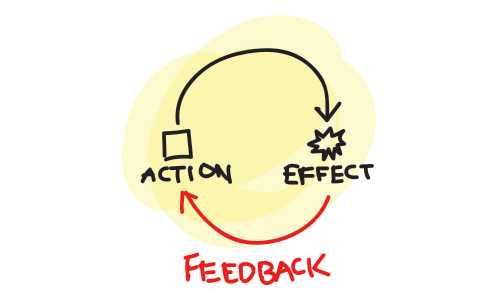
Oops, you’re stuck in a feedback loop…
At a local con back when I was a self-publisher, I went to a session on short story writing run by an author I believed wasn’t self-publisher friendly. During that session they said something that stuck with me. At the time it triggered upset and I thought they were elitist and mean, but in hindsight it became the central crux of my thoughts on what keeps so many self-publishers from progressing with their craft and their careers. They said, “the problem with self-publishing is no one ever tells them ‘no’.”
Many nos in the journey to traditional publishing are arbitrary and subjective. Based on the personal taste of agents and editors, the ‘marketability’ of your work, and sometimes just whether there is something too similar already in an agent’s stable, but every ‘no’ is a challenge to do better, a call to work harder, to learn, to perfect, to look more critically at your own work. Compare that to supportive communities built on telling you that you’re great. They’re comforting, but they’re suffocating your craft and leave you unprepared to face actual criticism when you leave your bubble. Not only that, but as I said earlier, the lens of your own desperation and hopelessness magnifies the severity of the criticism when you do receive it. How dare people tear you down so cruelly when the job is already hard and you have to fight against the stigma? When you’re already spinning your wheels and getting nowhere? When the dream you were so enthusiastic about pursuing has drained so much from you mentally?
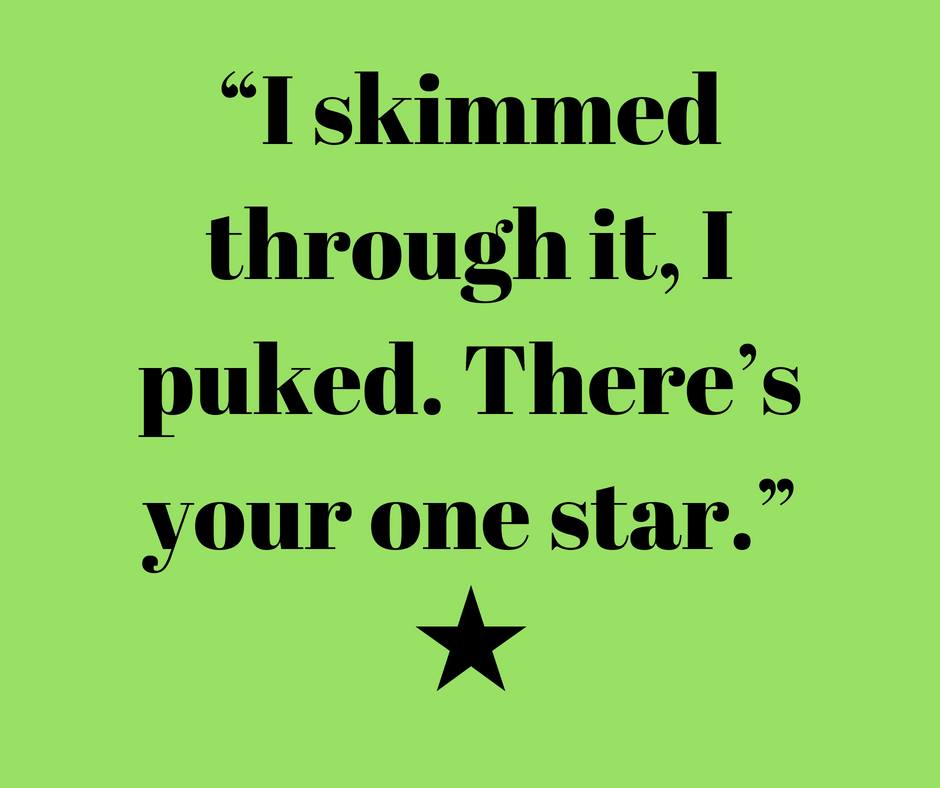
Aren’t Goodreads reviews fun? (Not one of mine, I don’t read them)
Unfortunately, you can’t have both a hyper-supportive bubble community and also demand to be treated no different from traditionally published authors, because the one thing traditional authors can’t escape, even if they wished to, is criticism. It’s the word no. No, it’s not good enough. No, you can do better. No, it’s not ready yet, keep working. The industry is full of no. Of this book wasn’t for me. Of edit letters and reviews and that word of mouth you need to succeed. You don’t get that without plenty of people disliking your book along the way.
And while it’s important to differentiate between constructive, supportive criticism, and cruelty under the guise of it, what we need as creatives are communities that foster a healthy ability to critique, to be able to give feedback without retaliation, and to feel safe in our vulnerability. If you don’t feel comfortable telling someone in your community that something in their work could be better (beyond basic things like punctuation and grammar), chances are they feel the same about yours and all you have is a false positivity bubble. Is that going to help you improve your craft? Or help you reach the next level in your career?
Growth comes in the uncomfortable places in life where you’re forced to sit back and truly consider the validity of someone’s words, and that increasing ability to look critically at your own work and engage with other people’s opinions about it without knee-jerking into angry defense, that is where the magic happens. But, like everything in life, it takes practice. It takes a lot of failing, a lot of no, before you get a yes.
(As a brief addendum, this is not the same as having to read every review of your work that comes your way. It’s up to you to choose where you get your required feedback. I read no reviews at all these days because I have a tried and tested group of people from whom I can get honest feedback, and my editor at Orbit has proven again and again that she has absolutely no difficulty in listing every single thing that isn’t working about a book. And no, it’s not softened with an equal number of things I did well. If she makes one positive note in the whole edit letter that’s cause for celebration.)
The Pitfalls of Grimdark
Phew, so I saved the most intense part of this for last, but here we go. Another recurring Drama I see in the self-pub SFF community is the attempt to minimise criticism about certain books because said criticism is based on their content. I see enough eye-rolling about how actually we can only write nice happy books now and grumbling over unfavourable reviews of books containing sexual violence that I think it’s time we talk about… grimdark.
If you don’t know what grimdark is I’m afraid I can’t really help you. No one has ever settled on a solid definition and forums are full of people arguing whether certain books do or don’t count, but broadly it’s a subgenre of fantasy that’s usually gritty, full of assholes and antiheroes, the world is going to shit and hope is in minimal supply. You can have one with little violence, but usually it’s also characterised by a lot of blood, gore, suffering and general awfulness. According to some, my debut WE RIDE THE STORM counts, though I don’t agree for numerous reasons I won’t bother going into as the definition isn’t the problem here.

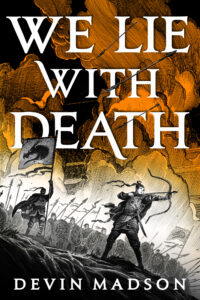
The problem is that a lot of people seem to think the way to write a grimdark novel is to replace all character arcs and development with suffering and shock-value atrocities, even to the point of selling it to people on the premise of “It’s great because the main guy eats everyone’s FACES off.” There may be a few individuals whose specific reading kink is face eating and that’s fine, whatever, each to their own, but what most people read for is their own personally-weighted combination of plot, character development, world-building, entertaining dialogue, inter-character relationships etc. None of these things can be replaced with face eating. Or baby killing. Or rape. Or genocide. You cannot write a narrative where your protagonist either suffers or perpetrates endless terrible things and not have that character engage with the aftermath, because character suffering isn’t the same as character development.
Connecting back to the previous idea of hyper-supportive communities, if you’re going to write a grimdark novel make sure you have people around you who will give HONEST feedback, people who feel comfortable pointing out where you’re not engaging with the content and have fallen into the trap of using it for shock value and nothing else, because if you’re going to write about heavy topics that trigger a lot of emotion in readers you have to be sure you’re handling them well. If you’re a part of a community that seems more interested in glorifying the grimness for the sake of grimness and its “cool factor”, and out-grimming each other in a never-ending game of atrocity one-upmanship, then you’re more likely to produce a self-insert style “Edgy Thing” that revels in its own cruelty than a grimdark novel that appeals to readers. So, decide which one you’re trying to achieve.
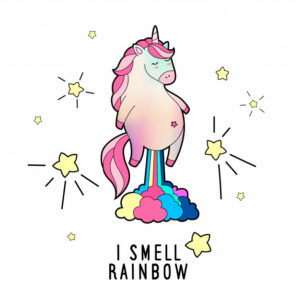
***Happy Books!***
This leads me to the most important point here: criticism of violent elements in grimdark novels. This has come up a lot during SPFBO’s history, especially in regards to poorly-handled or unnecessary sexual violence. To look at the nuanced critiques lately offered by the judges and boil it down to “turns out we can only have happy books” is to exaggerate and distort the critique, making it flagrantly ridiculous. “Of course no one wants only happy books so those judges should feel ashamed” is the response they’re after. This also happens when people take critique of sexual violence as being the same as pointing a finger at the author and shouting “you’re a rape-apologist!” No. Critiquing elements of a book and calling the sexual violence within unnecessary or gratuitous or any other descriptor is not an attack against the author’s moral fibre and to say so is to deliberately obscure the point.
As I said earlier, if you’re going to include content that triggers intense emotions you can’t just throw those elements into your book wherever you need some shock or horror or a replacement for character development – you have to be intentional about your use of it or you risk hurting a large portion of your readers rather than carrying them with you. Poorly-handled rape and misogyny that is never examined or engaged with is akin to slapping a big sticker on your book that says, “Hey ladies, this book isn’t written for you!” This isn’t because we never want to read rape. Sure, some women prefer to avoid it because why read about it in your escapism when you can just live that in the real world, but there are also many women happy to engage with such heavy topics for a variety of reasons. My debut, WE RIDE THE STORM, contains a rape scene I included after much thought and consideration, a deliberate choice to engage with the complexities of how such violence would appear to a non-patriarchal culture. Its aftermath is still being dealt with by the characters three books later in a variety of small ways, because that’s what real life is like. On the flip side, if you just throw rape (or anything else heavy) in without engaging narratively with it in any way, just to show a character is bad or to give a male character motivation to get revenge then you’ve done nothing but perpetuate the hurts of that violence upon your readers.
Most of the time this is either accidental or the result of failing to examine the reason for your choice, and yes, often, your own biases. We regurgitate a lot of ideas and tropes from the media we consume and our media is overwhelmingly violent toward women (among other minorities), so it’s easy to include it without thought, just as we are as a society often still include ableist language without thinking about it. But just because we meant no harm doesn’t mean we didn’t do harm. And throwing acts that trigger intense emotions in without engaging meaningfully and intentionally with them is breaking the unspoken authorial promise that you will keep your readers safe even as you guide them through what could still be the most blood-soaked, grim tome imaginable.
When it comes to critique about such elements in your work, someone not liking it is not on the same level as not liking your setting or your characters or most other things about your book. There is “this wasn’t for me” and there’s “this is actively harmful to me or others in my community”, and reviewers have a responsibility to the people who read their reviews to make this clear. This is not an attack, but it may be a moment for personal growth where you can work to break down the biases that led you to think the decision you made was ok in the first place. Sexual violence may be common in the media you consume, but someone else’s mistakes aren’t an excuse to shrug off critique and tell yourself that anyone complaining about its inclusion in your books is just a pearl-clutching wimp who should go read some romance or something.

I want to read grimdark. I want to read about antiheroes. I want to read books that challenge me, but violence for the sake of violence isn’t challenging. At best it’s lazy and boring, at worst it’s actively hurtful, and shouting “but it’s fiction!” or “but historical accuracy!” does not make that less true. Be deliberate. Be intentional. Engage with the darkness you choose to include or just leave it out. You can keep readers interested without blood. You can give characters motivation without suffering. You can show that guy is really really evil without rape.







